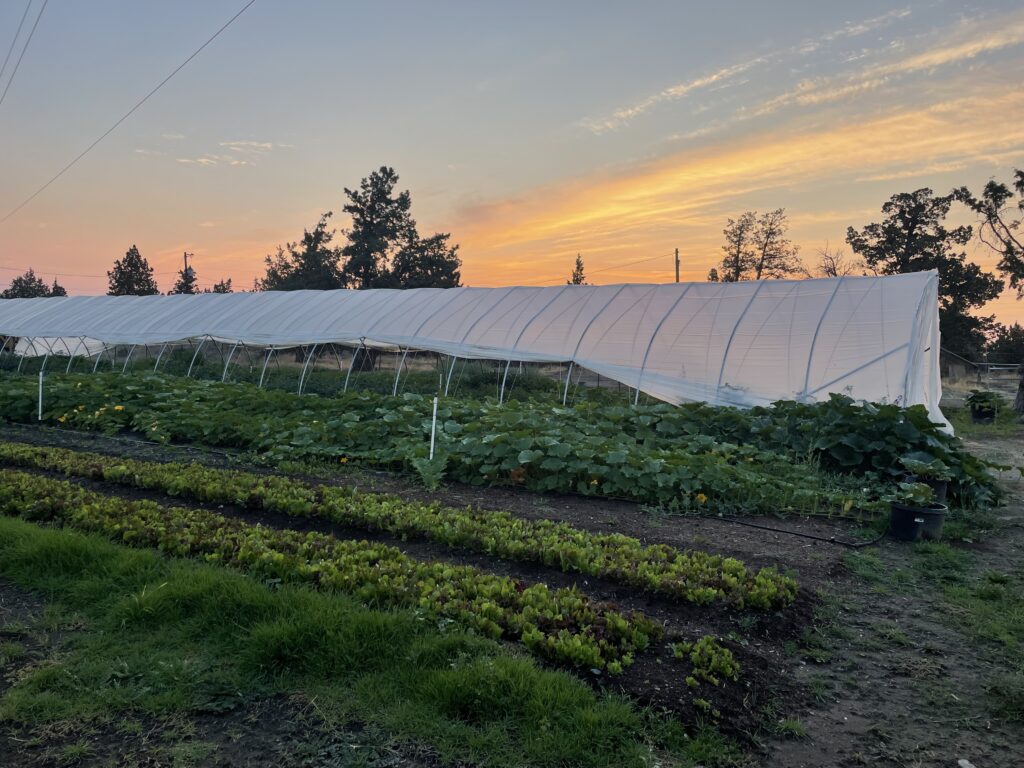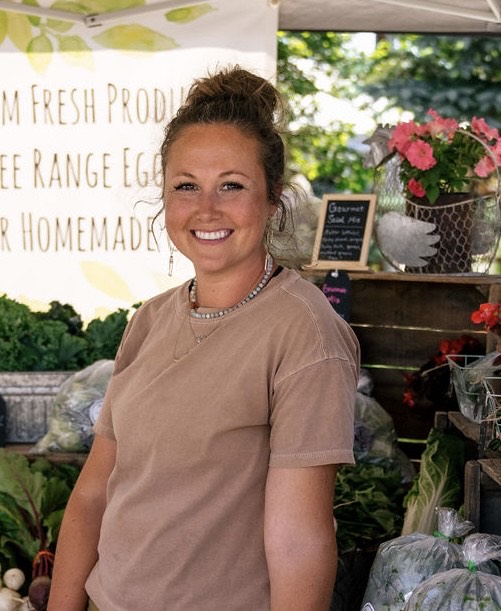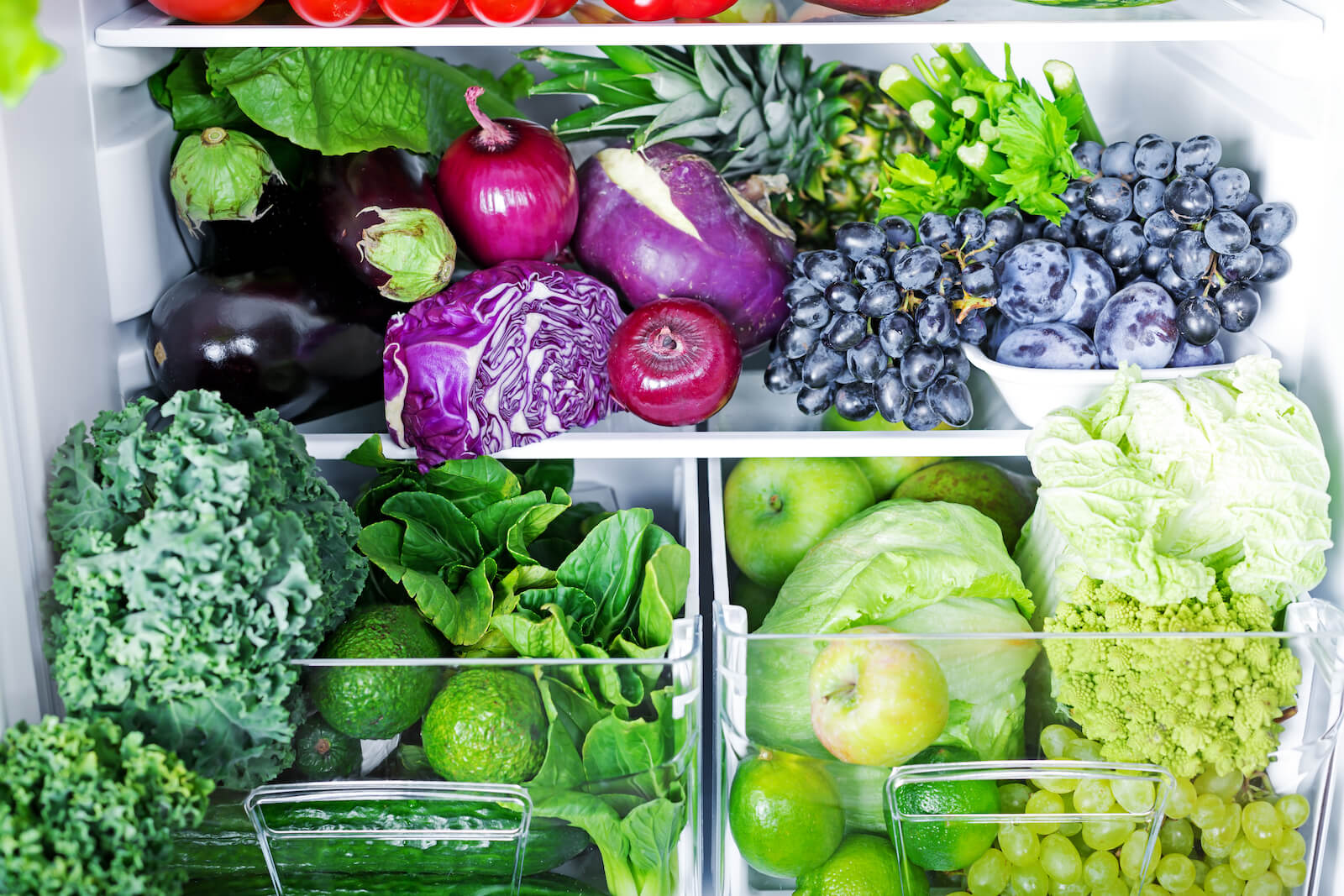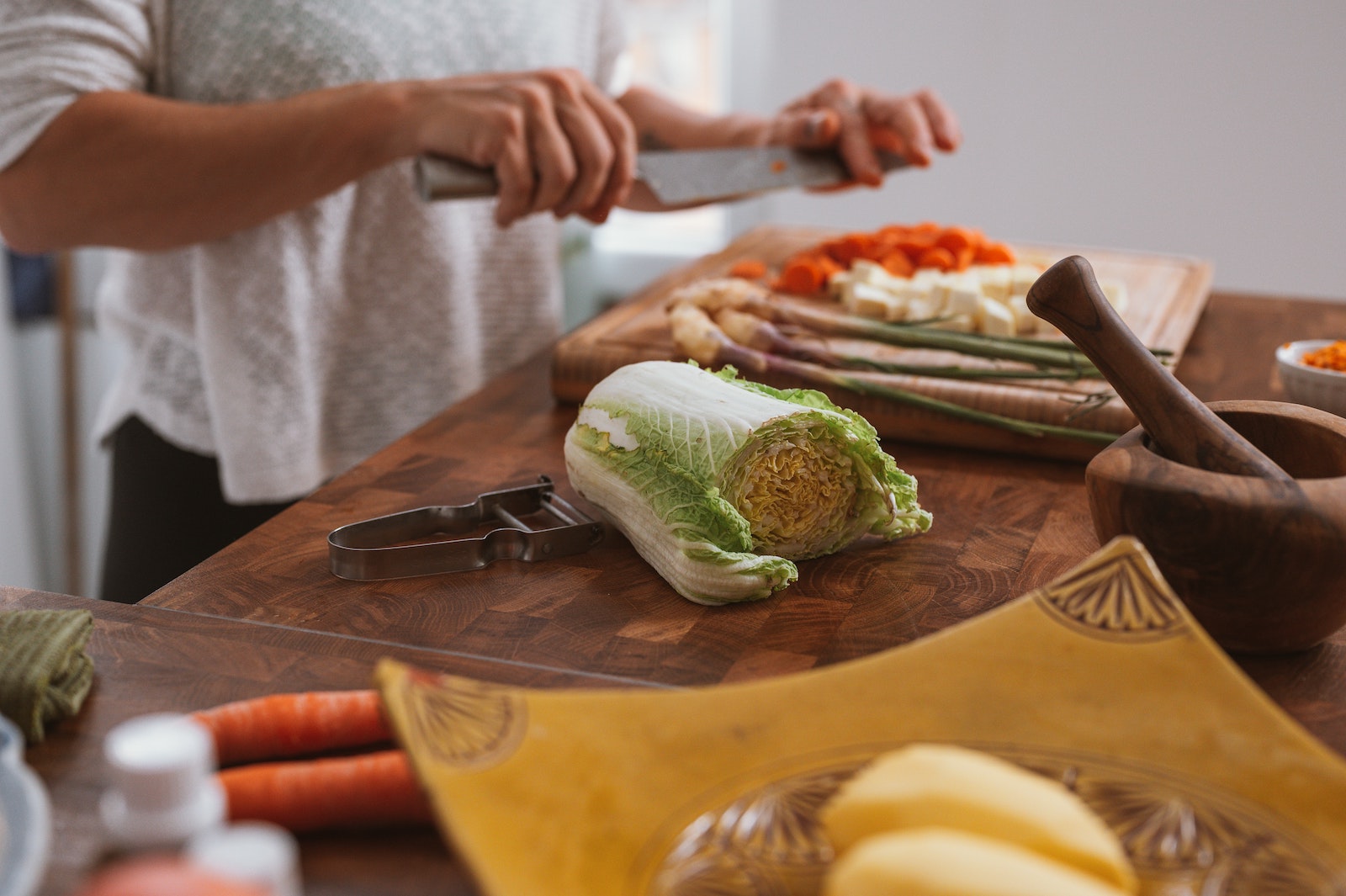Sometimes a single question can change your life. That’s what happened to Tiffany Hanks, owner of Abe & Oley Farms, and this month’s Community Connection feature. Read onto learn what motivated Tiffany to pivot her career and turn her small family garden into a hobby farm and now a ½ acre market garden farm. Tiffany and her family raise chickens and grow quality produce using a no-till, no dig,zero chemical and pesticide free model. We are inspired by Tiffany’s perspective and adaptability, and her commitment to caring for the land and people in Central Oregon. There is nothing better than nourishing ourselves with food grown with LOVE, and we are so grateful and lucky to have Abe & Oley Farms in our community!
IHM: Hi Tiffany! Thank you for chatting with us today. We know you made a pivot from a career in dentistry to farming! We’d love to learn more about your background and what motivated you to initiate this big change.
TH: You are correct! Dentistry was what I had known for 20 years, beginning as a sterile tech/dental assistant at age 17. I then went on to earn my Bachelor of Science in Dental Hygiene from OIT and practiced as a dental hygienist for 13 years. I honestly never imagined myself doing anything else. When my son was born in 2019, I was working four long days at the dental office and really felt I was missing out on being with him. I decided I needed to find a way to drop to 3 days of hygiene a week. Unaware of this, a patient of mine at the time asked if she could buy any extra chicken eggs or veggies from my garden when available. People wanted to buy my veggies?! As of May 2024, my husband and I are both farming full time. Although we both grew up with family gardens, we are self-taught, first-generation farmers. We provide veggies and eggs for two weekly farmers’ markets, do weekly farm order pick-ups, and make deliveries to both Redmond and Bend. What a ride it’s been!
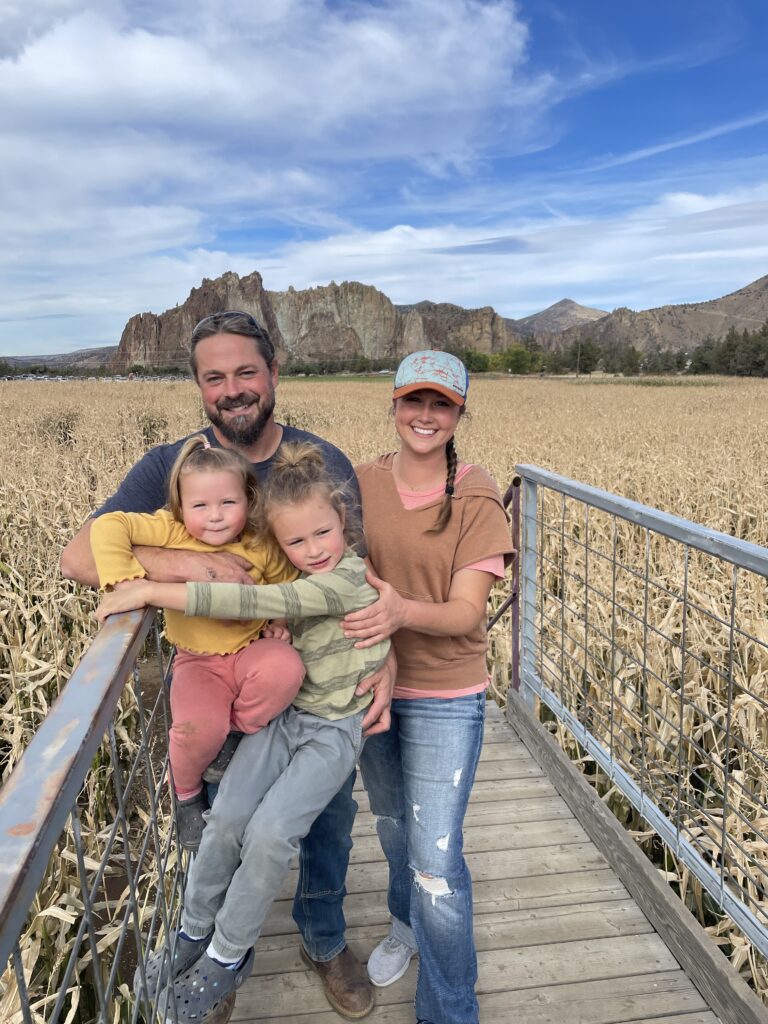
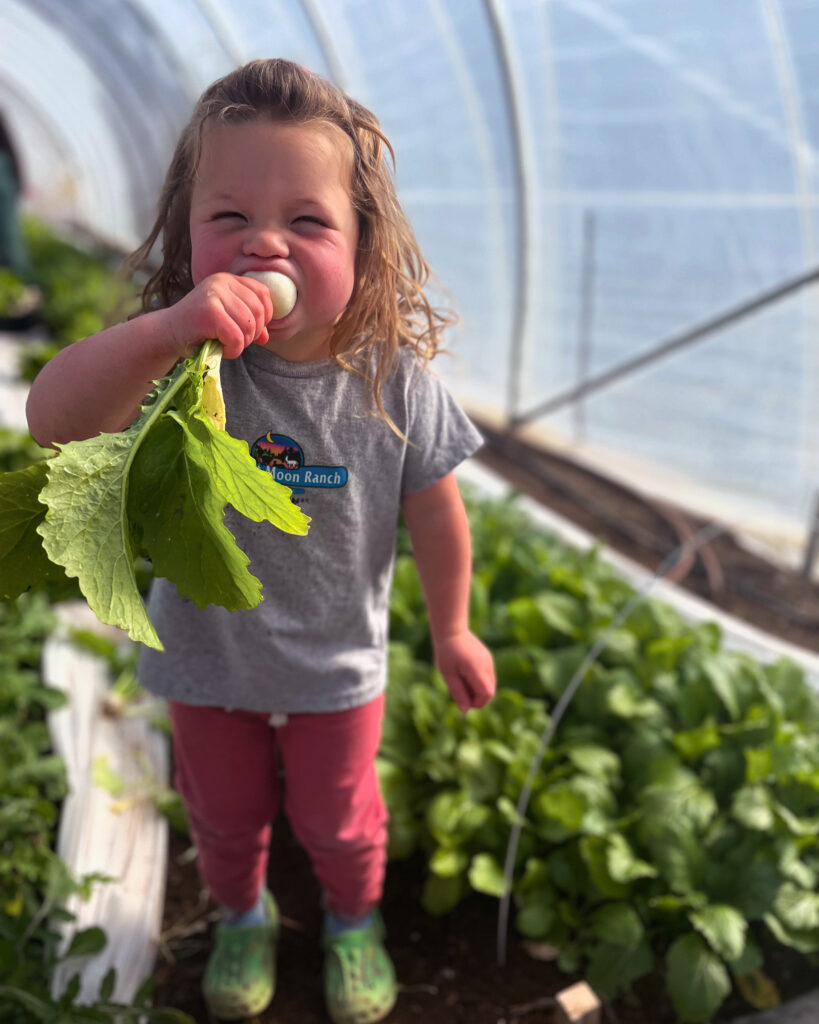
IHM: What are you currently growing and how is this season going? You started a self-serve farm stand this summer, which we’re sure our community would love to know more about!
TH: This season has been great in many ways for us, but growing in the high desert always comes with its challenges and learning opportunities as I’ve come to appreciate. There are often freezing temps at the end of June and then again in August, big day/night temperature swings, and plenty of extra measures to protect and grow crops. Right now, we are hanging on to the last of the summer bounty – think tomatoes, cucumbers, hot and sweet peppers, and basil. Fall is quickly approaching, so we are seeding and transplanting more cold-happy crops weekly such as broccoli, cabbage, kale, fennel, leeks, green onions, cilantro, radishes, salad turnips, head lettuce, spinach, and lettuce mixes. The thing about growing food in Central Oregon is you’re not only growing crops for the current season, but also storage crops to feed us through the winter months. So we have already harvested our garlic and onions, and the storage carrots, potatoes, and winter squash are not far behind.
We also built our self-serve farm stand that is on the brink of completion, so exciting! We hope the self-serve style allows for more access to local produce, as people seem to appreciate the feel of shopping this way and being able to swing by at their convenience. The stand is located at our farm.
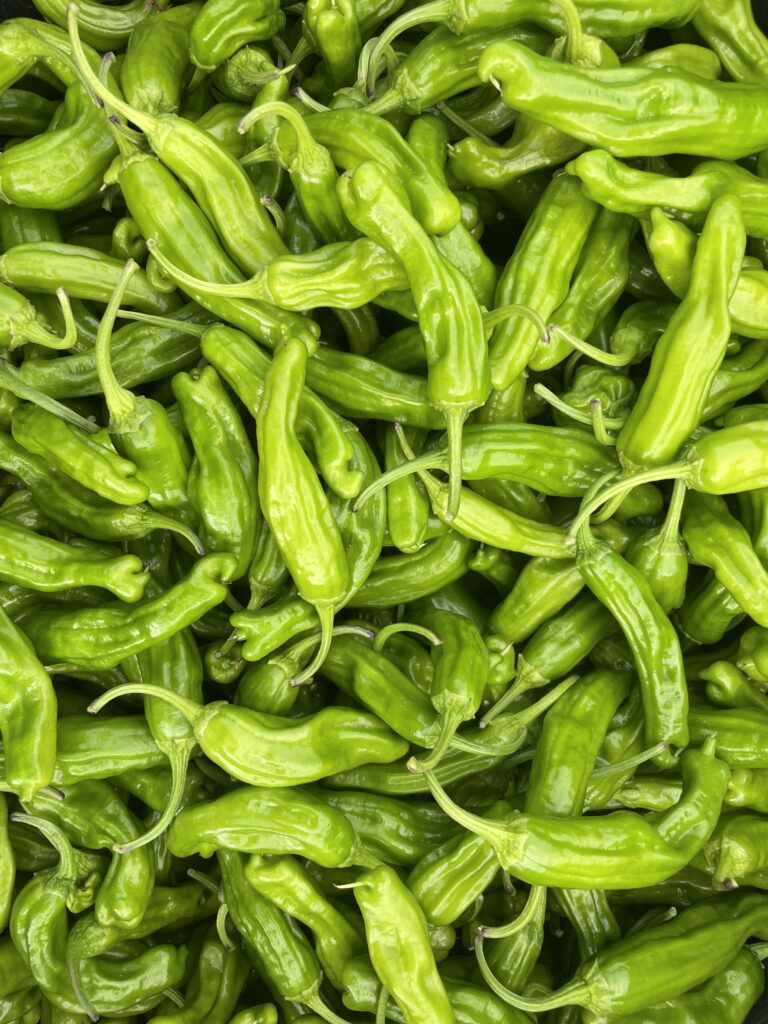
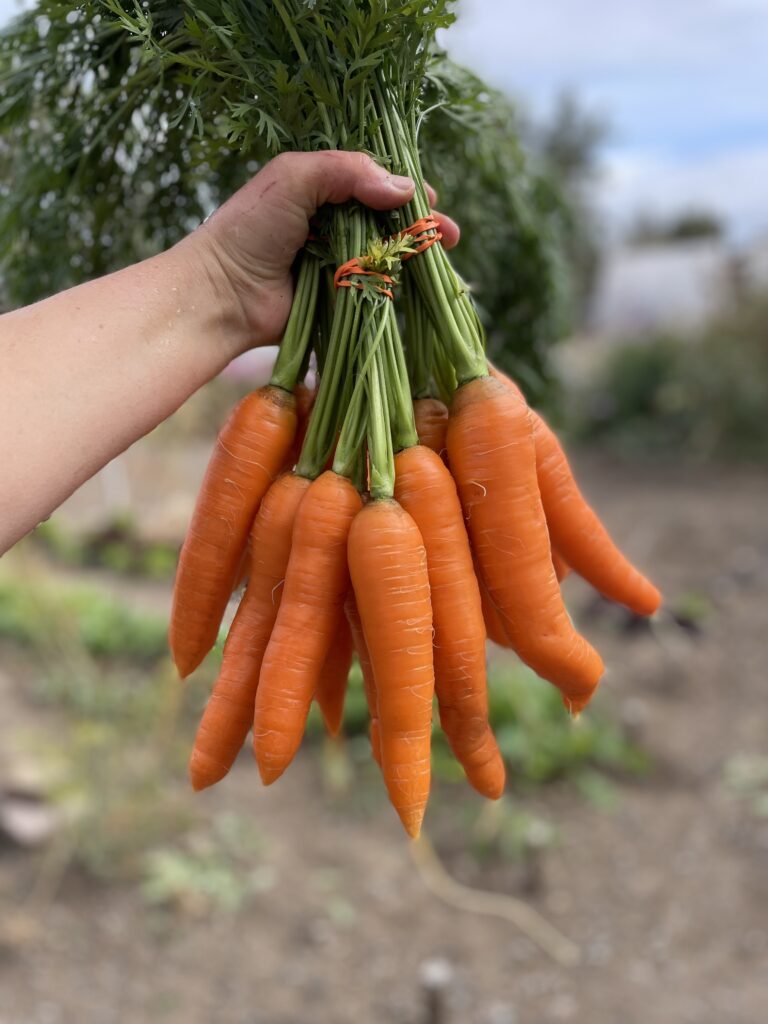
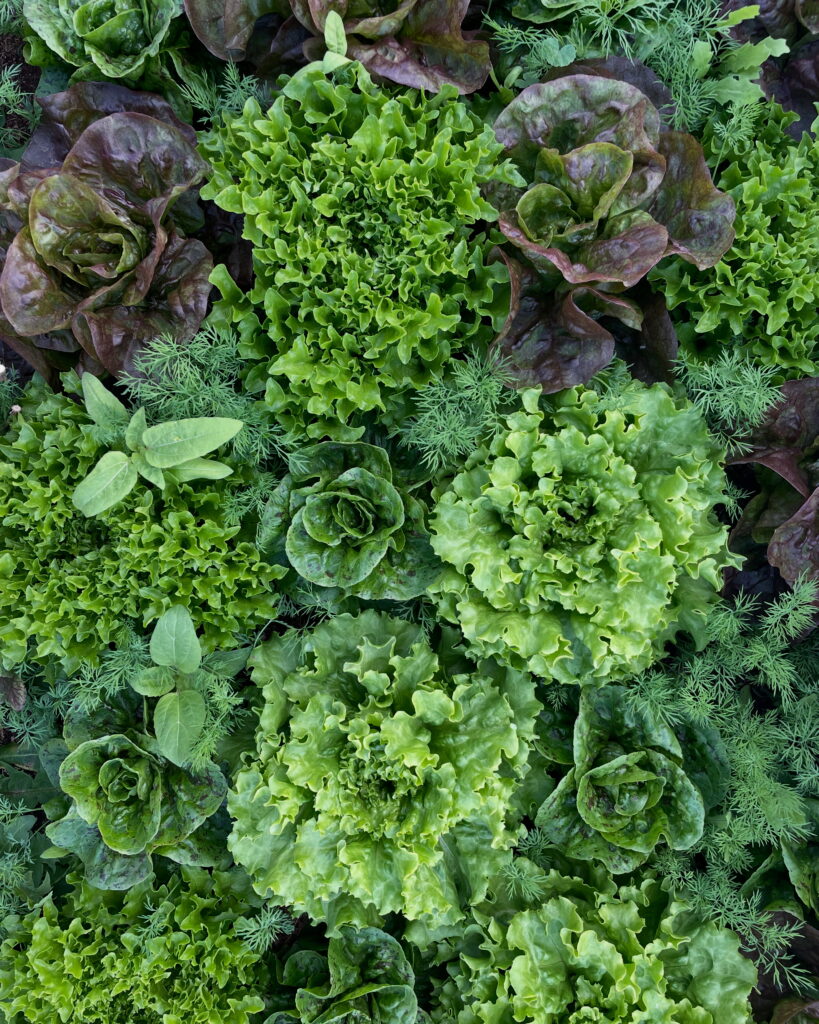
IHM: You accomplish a lot on half an acre! Tell us about your farming practices and ethos.
TH: I think there is a general misconception that you need a lot of space to grow food. Before we had the land we grow on now, I grew a lot of veggies in containers, and honestly, some vegetable varieties do quite well or sometimes better in pots or felt bags. There are also creative ways using your vertical space to be successful growing your own food.
Our entire market garden farm follows a no-till, no dig, zero chemical and pesticide free model. We turn our own manure into compost to build the soil from the standard Central Oregon moondust we started with. Each crop is started from organic seed and cared for with our own hands and hand tools. To grow the quantity of food that we do, our winter months are spent developing strict crop plans to ensure an efficient and productive season. I keep notes of new things to try or do differently for the following season, we are continually learning.
IHM: Your year-round Homestead Boxes are a wonderful offering. Tell us how your boxes are different from other traditional local farm boxes. And how do we sign up for these?
TH: We became CSA box members for the first time over a decade ago. For anyone not familiar with Community Supported Agriculture (CSA), it is a way for people to buy shares of a farm’s harvest in advance. The shareholder receives fresh produce and other farm goods throughout the growing season and the advance payment helps the farmers significantly when most needed. We loved being CSA members, it’s what helped us develop our Homestead Boxes. Ours differ from the traditional CSA boxes in a couple ways. The first being you get to pick the items with each box you order. If you’re not a big fan of kale or salad turnips, so be it! But we like to think we could change your mind. Secondly, you order a box when you’re in need. We feel this allows for more flexibility with families’ schedules and less food waste.
Interested in signing up for a Homestead Box? Check out the Abe & Oley website and send them a message!
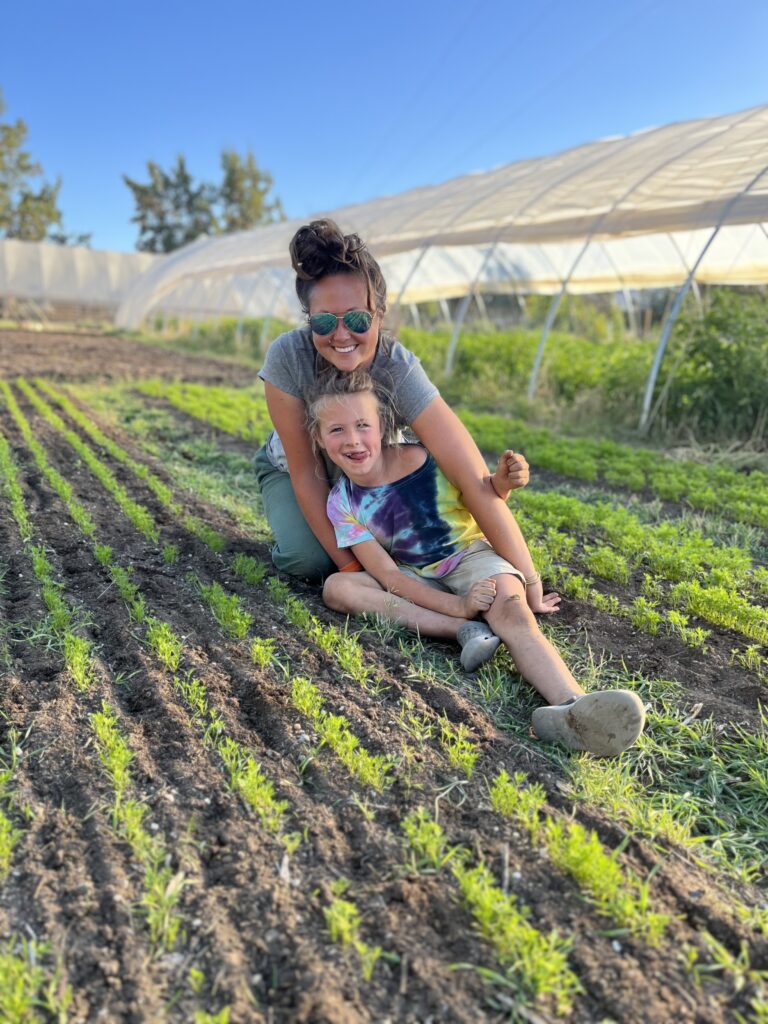
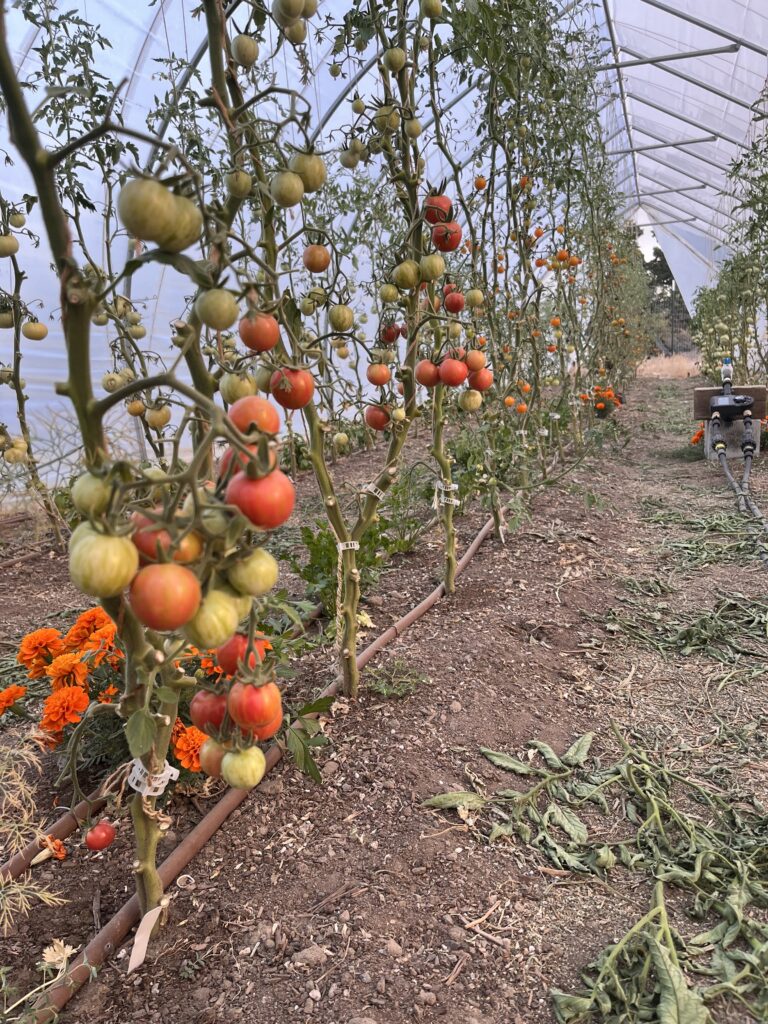
IHM: What have been your greatest learnings since you began this journey and what has been the most rewarding aspect?
TH: I think the greatest lesson that farming has taught me is to focus on the good. Each season comes with its challenges and failures, just when you think you have every detail figured out to make for a successful season you are reminded that you don’t. A new pest or a season that is too hot or cold that confuses the crops. There is so much out of our control. When one crop is struggling for whatever reason, I would spend so much mind space on it. Now I’m able to let it go, try again, and focus on the crops that are thriving instead.
The most rewarding aspect is the connection to the land – I grew up hunting and gathering as a family, but what a gift to tend our own land to provide for ourselves and others.
IHM: How have your children embraced farm life?
TH: They’ve been born into it, so they don’t know any other way. Abe (6) and Evelyn (4) thrive on the farm and I believe that all children would if given the opportunity. Although they are quite young, they can be helpful in many ways. They love harvesting – digging potatoes, pulling carrots and beets, picking cherry tomatoes and eating them of course! They see and contribute to the hard work that our family puts into this farm and I pray that lasts their lifetime. They also see the people we are feeding and know how grateful they are of us, they feel appreciated for what they do for others. Lastly, they learn so much invaluable real life on the farm that can’t be taught behind a school desk.
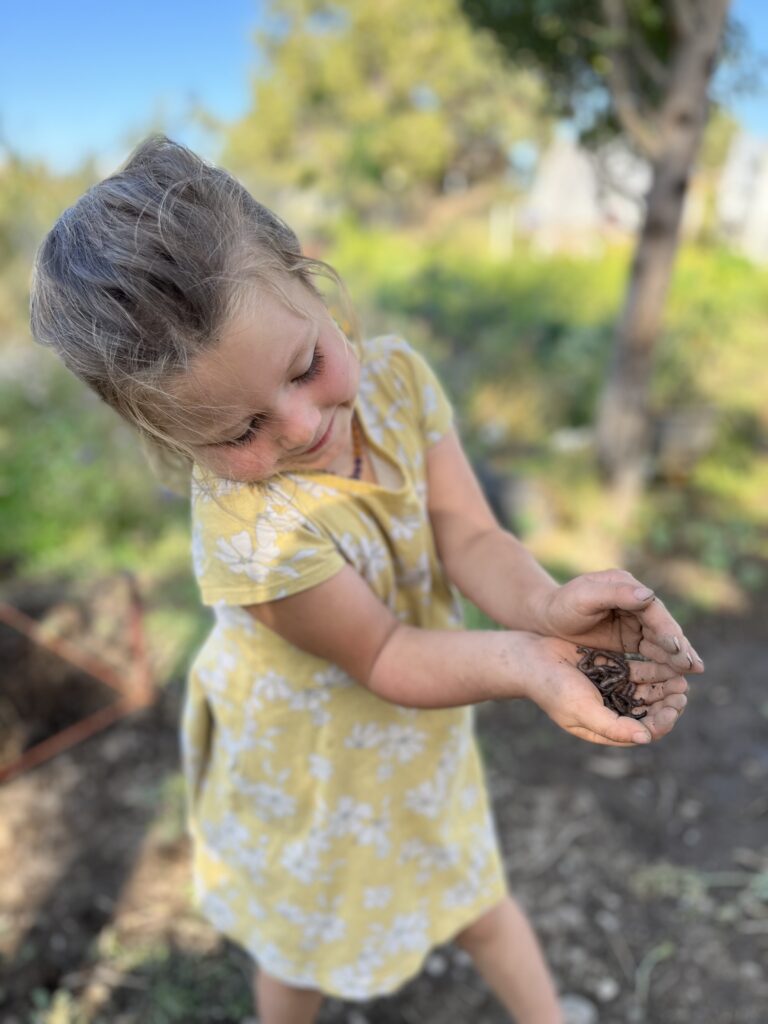
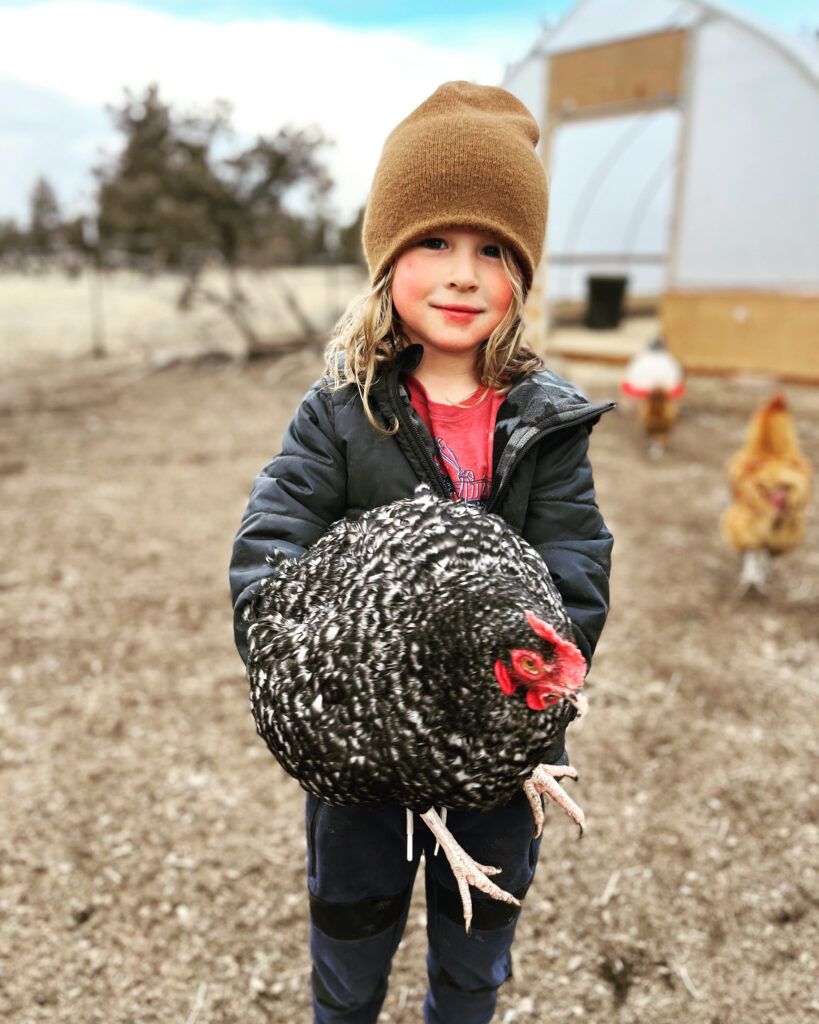
IHM: We’d love to learn more about your journey with functional medicine at Inspired Health.
TH: My functional medicine journey with Dr. Weintrob began this year, although it’s not new to my lifestyle. After my second child was born, I felt ‘off’ but figured my body just needed more time the second go round to feel like me. Nearly four years later and a lot of life changes, I decided I needed help to heal my body.
I’ve been most impressed with Dr. Weintrob’s confidence in helping me feel good again. The detailed testing also intrigued me, as I come from a science-based way of thinking. The DUTCH test blew my mind and should be known/available to all! Such a valuable tool to evaluate hormonal health and with Dr. Weintrob’s knowledge, help bring it back to balance. I am forever grateful for her help in my journey to overall health again!
IHM: Are there any music, books, podcasts or shows that have inspired you lately?
TH: Anything written by Jean-Martin Fortier is always in my back pocket since we’re in the thick of the busiest part of the growing season! I can’t tell you how many times I refer to his books and podcasts, sometimes on a weekly basis. “With 20 years of experience in small-scale organic farming, JM Fortier has dedicated his life to sharing his knowledge and passion for organic regenerative agriculture with others. His farming books are a mine of information for all those interested in organic intensive market gardening.” – The Market Gardener website
On a somewhat funny side note. My kids broke the first remote to the tv and somehow ‘lost’ the second remote, so we’ve been without tv for several months now and it’s been lovely!
IHM: Which of our 8 Pillars of Inspired Health are you personally giving extra attention to these days?
TH: SLEEP. It’s one of the main reasons I sought out help from Dr. Weintrob. Poor quality sleep was affecting so much of my life, including migraines. Sleep is so important to our overall health and well-being.
I’m also trying to set aside time for Creativity & Play. This has always been a challenge for me, but I’m learning that there will never be a time when everything on my checklist is completed. Life is too short to live by to-do lists!
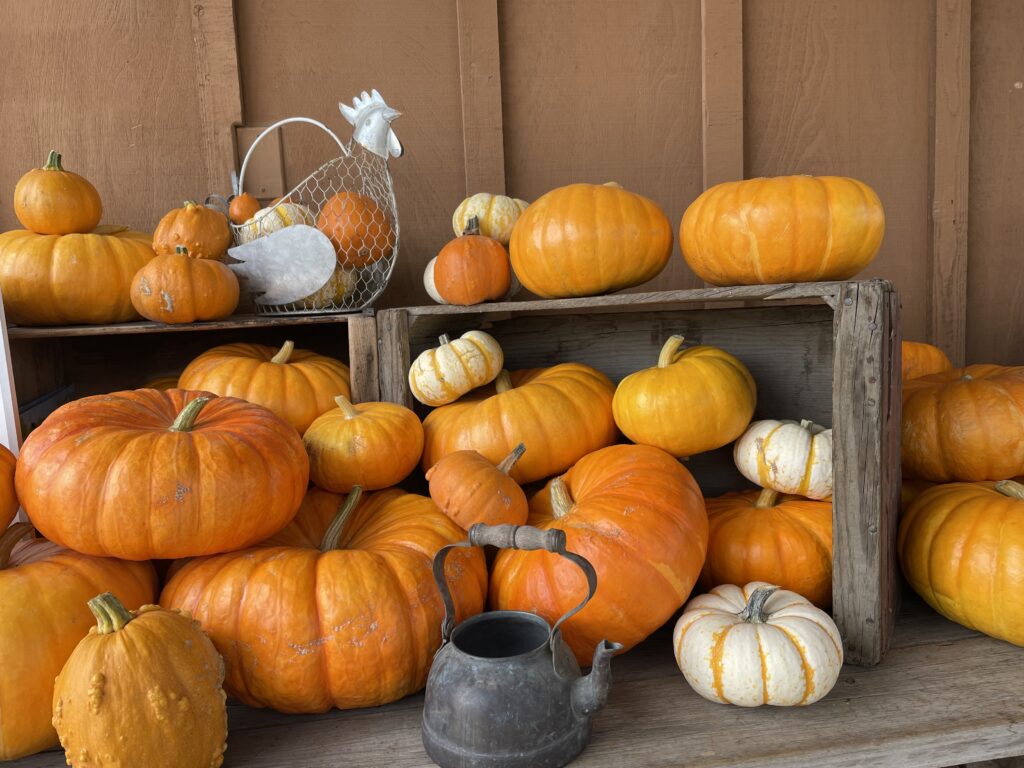
IHM: And as usual, let’s share some Central Oregon love! Can you share a couple of your favorite local businesses?
TH: Central Oregon has such a wonderful community of farmers markets. I encourage anyone who is interested in supporting local businesses to begin there. The markets are a great way to find things you’re looking for, while supporting the businesses directly. Even after the market season has ended, you can continue buying the products locally at stores and through their websites. We do much of our shopping with other vendors this way. We love Bohemian Roastery for organic wood fired coffee, Brittany’s Bees and Broadus Bees for our local honey, and Morelli Meats for beef. You see the people and family you’re supporting, it’s a small step to keeping a community thriving.
Thank you Tiffany!
Learn more about Abe & Oley’s farm on their website, follow them on Instagram @abe_oley_farms and Facebook and visit them at the Sisters Farmers Market every Sunday at Fir Street Park from 10am – 2pm, June to October.
